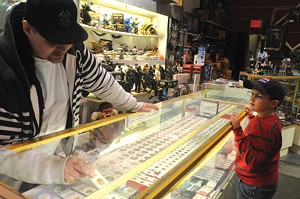Published November 27, 2013 at 1:45 p.m.
Linda Samter seems like an unlikely target for burglars. The 47-year-old architectural designer works from an office in her Charlotte home, where she spends much of her day. She routinely locks her doors and windows whenever she’s away.
But recently, Samter let her guard down and paid a hefty price. While she and her husband were gone for a long weekend, they left their house open for a contractor, who had some work to finish inside.
On Tuesday morning, November 12, Samter went to put on a gold watch that her father, a Swiss watchmaker, had given her years before. The box was still there, but the watch was gone. To her horror, Samter discovered that several other pieces of fine jewelry were also missing, including her wedding band, her grandmother’s ring and a bracelet with multiple rubies, the last of which was a high school graduation gift.
“They were my best jewelry, and they were all sentimental,” Samter laments. The thief or thieves “knew exactly what they were looking for.”
Within 20 minutes of Samter’s call to the Vermont State Police, Senior Trooper Benjamin Katz was at her home to investigate. Unlike most burglary victims, Samter was able to provide color photos and detailed descriptions of all her missing jewelry, including unique inscriptions, which should have made those items easy to identify and recover.
Over the next few hours, Katz and Samter scoured local jewelry stores and secondhand shops looking for the jewelry and asking if they had seen a “person of interest:” Scott Michael Fysh, the 35-year-old workman who had been painting Samter’s garage and had access to the house. A criminal background check later revealed that Fysh had an outstanding arrest warrant in Florida for violating his probation on convictions of theft, dealing in stolen property and receiving money from a pawnbroker using false verification.
Among the shops Katz contacted were Martin’s Coins and Jewelry, on Shelburne Road in South Burlington, and Gold Collect, a kiosk in South Burlington’s University Mall, both of which buy precious-metals from the public. Employees at both stores claimed they hadn’t seen Fysh or purchased Samter’s stolen items.
But that wasn’t true, police would later conclude. In his affidavit charging Fysh, Katz alleges that Fysh not only visited those stores, but sold them Samter’s jewelry. How did Katz know? By law, secondhand precious-metal dealers must take digital photos of all the items they buy and make copies of the seller’s ID.
While Katz says the dealers eventually provided him with that information, he contends they did not comply with another requirement of state law — that dealers hold such items for 10 days before they can be sold or offered to the public. The intent of that law, for which Katz lobbied two years ago, is to give police time to conduct investigations and, if they’re lucky, return stolen goods to their rightful owners.
Like most burglary victims, Samter wasn’t that fortunate. She learned later that her finest jewelry pieces, worth a total of around $10,000, had been purchased for a fraction of their true value. They were sold within 48 hours to out-of-state smelters and destroyed.
Neither Vermont metal dealer has been cited for a violation, but Chittenden County State’s Attorney T.J. Donovan says the investigation is ongoing. The owners of both stores say they’ve done nothing wrong and are being singled out because they’re visible, brick-and-mortar businesses. They say they do their best to help police thwart thieves. The real culprits, they contend, are the gray-market precious-metal dealers who set up in county fairs, flea markets and hotel rooms, and are accountable to no one.
Fysh was arrested and charged with grand larceny and selling stolen property, and now faces extradition back to Florida. He was arraigned on November 15, pleaded not guilty and is being held on $2500 bail.
But the criminal case provides small comfort to Samter, who lost family treasures she can never replace. The trooper is frustrated, too.
“My primary goal as an investigator is to return stolen property,” says Katz. “A lot of these items are family heirlooms, and it’s heartbreaking going to these cases day after day.”
Quick Cash
Katz spends an increasing amount of his time on burglary investigations — and he’s not the only police officer doing so. Statewide, burglaries increased nearly 18 percent between 2010 and 2011, the last year for which figures are available. And while there’s no hard data to support the claim, police and prosecutors say the majority of property crimes are driven by Vermont’s drug epidemic.
“When you don’t have any money for your next fix and you’re going to get dope sick, you’re not terribly concerned about where your money is coming from,” says Detective Ron Bliss of the South Burlington Police Department. “The easiest route is the first person who’s going to hand you cash — no questions asked.”
Peddling stolen goods to support an addiction isn’t a new phenomenon. What is new, says Katz, is the ease with which these stolen goods, especially jewelry and small electronics like smartphones and tablets, can be flipped for quick cash.
“Before, people might have put these items on eBay or Craigslist,” he says. “Today, they’re doing the burglary at 10 in the morning, selling it by 1 and then, unfortunately ... shipping them out of state before the end of the day, before the homeowner even knows they’ve been robbed.”
Police and prosecutors emphasize that not all secondhand shops and precious-metal dealers traffic in stolen goods. But they express frustration that some aren’t doing enough to stem the tide. Donovan says that even when investigators have strong suspicions that a business knowingly buys stolen goods, it’s very difficult to prove in court. But he says he’s seen enough of these cases to know what’s going on.
“They’re buying stolen jewelry for pennies on the dollar from drug addicts and selling it to refineries out of state,” Donovan says. “Clearly, these secondhand dealers are enabling the drug epidemic to continue, and they’re making a profit off of it.”
These are not “pawnshops,” which are regulated in Vermont and lend money in exchange for valuables that the seller can buy back. Secondhand precious-metal dealers, which are not regulated, maintain storefronts primarily to have a public place to receive goods. In some areas, including Barre and Rutland, fly-by-night dealers have been known to set up shop in hotel rooms for one weekend only, advertising that they’ll pay “top dollar” for gold and silver.
“Right now, I could put a sign right in front of my house saying ‘I buy gold and silver 24/7’ and open shop with no rules or regulations,” says Rep. Diane Lanpher (D-Vergennes), who sponsored legislation earlier this year to crack down on the less scrupulous metal dealers. A larger version of her bill passed the House but has yet to come up in the Senate.
In recent months, a joint legislative committee has been looking at ways to combat abuses in the industry. Among the proposals being discussed, says committee chair Rep. Thomas Koch (R-Barre), is licensure of all precious-metal dealers; a requirement that sellers pay by check only, possibly with a 10-day hold; and that customers provide proof of ownership, such as a bill of sale, for all transactions. The committee, which is due to issue its report in January, is also considering stiff penalties on businesses that repeatedly break the law.
But some secondhand dealers say they’re being unfairly blamed for the byproduct of a drug epidemic they didn’t create and cannot control. While several business owners contacted for this story say they support “appropriate” licensing and regulation of the industry, they contend that some rules that have been discussed, including bonding of all dealers and an extension of the 10-day waiting period to 15 or even 30 days, would drive them out of business.
John Martin, owner of Martin’s Coins and Jewelry, declined Seven Days’ interview request. However, his attorney and lobbyist, Mike Gadue of Colchester, came to Martin’s South Burlington store and spoke on his client’s behalf about the Fysh case and what he calls the legislature’s “emotional” and “knee-jerk reaction” to the recent crime wave.
Gadue confirms that one of Martin’s employees did purchase Samter’s gold watch band and bracelet from Fysh for $334, and that the items were “inadvertently” shipped out of state. But Gadue says his client had three contacts with the police that day and actually helped solve the case by providing them with the suspect’s photo ID and local address. He says the employee had no idea the items were stolen.
“Our position, very simply, is that Mr. Martin was completely open and above board with the police in all stages of the investigation, and that his employee provided information that, quite frankly, may have ... been the basis upon which they found this guy,” Gadue says. “Through an error, the gold was not kept within the state, but Mr. Martin had no direct involvement in that nor any knowledge of that.” Gadue said he did not know whether the employee who carried out the transaction had been disciplined.
Gadue doesn’t deny that some customers try to sell Martin stolen goods, but he says Martin does what he can to prevent it. Unlike some precious-metal dealers in the area, he says, Martin pays by check only, made out to sellers to ease tracking, and doesn’t buy from minors. He also photocopies every seller’s driver’s license and takes photos of the goods being sold.
Gadue argues that the police have no system for notifying secondhand dealers about stolen property or the suspects accused of taking them. He points to a blue three-ring binder labeled “stolen items.” The binder, crammed three inches thick with photos and papers, dates back years. As Gadue thumbs through its pages, he points out that nearly all the information was provided not by police, but by people who visited the store looking for their belongings. Because most of the descriptions are vague, including crude hand drawings, they’re not very useful.
“Is there any way you can come in here with a description that says, ‘I lost a sapphire ring that was 14-karat gold’ and think John’s going to find it?” Gadue says. “Impossible!”
Martin and his employees write “between eight and 40 checks a day” for the hundreds of items they buy, he says. As a result, there is “no physical way” Martin could determine which ones were stolen. Indeed, during a reporter’s half-hour conversation with Gadue, more than a dozen customers came into the shop to sell wares, including coins, jewelry and antique silver. Not once did Martin or his employee glance at the binder.
So, how do these crimes get solved?
“They don’t. That’s what I’m telling you,” Gadue insists. “The problem is, the police are looking for a way to say it’s John’s fault ... because these crimes are such a low priority for them.”
Coin Opp
Police and prosecutors bristle at the suggestion that burglaries are low on their to-do list.
“I would strongly disagree with that. Some of these cases are very high priority,” says Bram Kranichfeld, executive director of the Vermont Department of State’s Attorneys and Sheriffs. Kranichfeld says he’s heard of individuals showing up with “pillowcases of jewelry” to sell in secondhand shops, week after week.
“How many times does that have to happen,” he asks, “before someone calls the police?”
Diane Wheeler, deputy state’s attorney in Franklin County, says the 10-day mandatory holding period was a good first step. But many precious-metal dealers see the $100 ticket — the price of violating it — as a cost of doing business. When metal prices are in flux, she says, “Often, it’s cheaper for them to pay the fine than to keep the item.”
Earlier this year, Wheeler worked on a case involving three Grand Isle residents charged with stealing gold coins from an Alburgh man, then selling them to dealers in Franklin and Chittenden counties, including Martin.
The victim was a 66-year-old recluse and hoarder known only as Radkin, who was crushed and killed by a horse trailer on his property in March 2012. Because the man had few friends and no local next of kin, months went by before his body was discovered.
In the interim, most of his belongings, including more than $200,000 in gold coins, were looted from his property. Police first learned of the coins in December 2012 through a confidential informant, court records indicate, nine months after Radkin died.
On November 11, one of the three defendants, Mark Mumley, 52, pleaded guilty to burglary, buying, selling and possession of stolen property and was sentenced to 21 months to eight years. Similar charges are pending against Ricky Benjamin, 35, and Jennifer Jarvis, 32, both of whom pleaded not guilty.
Gadue says that between September 18 and December 7, 2012, Martin purchased gold Canadian Maple Leafs and British Sovereigns from six individuals, including some of the defendants. Trooper Katz points to this case as evidence that precious-metal dealers need better oversight.
“We really want to work with these dealers,” Katz says. If someone comes into a store and is willing to sell thousands of dollars in gold coins at a fraction of their face value, Katz says the police should at least get a call. If not, “there’s something weird going on.”
But Gadue, who testified before the study committee considering the licensure of precious-metals dealers, calls the Alburgh case “an anomaly.” He says there’s no way his client could have known those coins were stolen, as none had been reported missing. Furthermore, he says, his client followed the letter of the law, obtaining names, addresses, phone numbers and government IDs on every transaction — information, he adds, that was later provided to police.
“If you look closely at that case, it is very clear that law enforcement dropped the ball,” Gadue concludes. “They didn’t protect this guy’s homestead and then, ultimately, they’re looking to hold John responsible to do something the law doesn’t require him to do.”
No-Buy List
On a recent weekday morning at the University Mall in South Burlington, Yin Xie, owner of Yin’s Collectibles, eyeballs a small ring that a young woman just brought in to sell. The woman, who says she’s from Burlington and looks to be in her early twenties, tells Yin that it belonged to her grandmother, who died several months ago.
Yin’s store offers a hodgepodge of used items, including DVDs, LEGO sets, action figures, swords, knives, jewelry and commemorative cards. As Yin examines the ring under a magnifying glass, another clerk steps up and informs the woman that her name is on a police list of suspicious sellers. The woman protests, asserting it’s her boyfriend, not she, who’s been in trouble with the law. After a minute of haggling, Yin hands her a $20 bill for the ring, and she hurries out of the store.
Outside the store, the woman declines to comment. Later, when Yin is asked about the transaction, he explains that the young woman “is not the one who has any issues with police. She just hangs out with the people in trouble.” When asked to reveal the police list or the woman’s name, Yin declines, explaining it’s “just a warning list,” and that there’s no legal mandate not to buy from certain people.
Yin, who’s been in the University Mall for four years, says he’d actually prefer stricter guidelines around a no-buy list to having the police confiscate stolen goods after he’s bought them. He says the cops recently relieved him of $900 in jewelry on those grounds.
“If I have a list in front of me and still buy the stuff, that’s my fault,” Yin says. “But if I don’t have a list … I don’t know it’s stolen property, but I still lose the money on it.”
Yin says he’d have no problem if the legislature adopted stricter laws on precious-metal dealers, as long as everybody had to play by the same rules. But he doubts whether they’ll do much to prevent thefts from occurring.
The police, Yin says, “think that, OK, if nobody is buying, nobody is stealing. That’s not true. They can go to New Hampshire. They can go to New York. They can go on their computer.”
But Gadue contends that if police established a “blacklist,” it would likely be challenged as unconstitutional, because it would impinge on the right of individuals to freely enter into contracts.
About 20 yards from Yin’s Collectibles is Gold Collect, a kiosk that advertises it buys gold in “any condition.” Earlier this month, Trooper Katz alleges in court papers, a Gold Collect employee bought some of Samter’s jewelry, which was sent to an out-of-state smelter before the 10-day holding period was over.
According to the Vermont Secretary of State’s office, the owner of Gold Collect is Garth Alex Morris, of Passaic, N.J. Reached by phone, Morris says he’s one of several partners who own the kiosk, which has been there since May 2012, as well as “multiple” gold-buying operations in four other states.
Morris says it’s “not a problem” for him if the legislature decides to license his industry or extend the mandatory holding period; he says that other states where he operates have even longer waits. When asked whether his South Burlington outlet abided by Vermont’s 10-day holding period in the Fysh case, Morris says, “That’s irrelevant. That’s an ongoing case and we’re working with Benjamin Katz on it.”
Evidently, South Burlington has become a hub for a lot of this illegal trade. Katz knows of offenders on probation wearing GPS tracking devices who’ve gone into the University Mall to sell stolen goods. Says South Burlington Police Chief Trevor Whipple, “We’re the primary location in Chittenden County.”
“It’s a tremendous burden on our department,” says Bliss, one of only three South Burlington detectives who handle everything from frauds to homicides. “The dealers, for the most part, are following the rules, but the rules aren’t tough enough.”
Ready for Regs
Katz suggests that most Vermont jewelry stores would be unaffected by more state regulation of precious-metal dealers. He points to Perry Sporn, owner of Perrywinkle’s Jewelry in Burlington, as one businessman who “gets it” and is doing his part.
Sporn, who owns 18 jewelry stores, diamond factories in India and Israel, and a jewelry factory in downtown Burlington, says he, too, supports licensure of secondhand precious-metal dealers. Shortly after Tropical Storm Irene, Sporn briefly opened a gold-buying business in Rutland’s Diamond Run Mall, he says, to help Vermonters who need money quickly get back on their feet. One day, the store manager informed Sporn that he was seeing “repeat customers” coming in.
“As soon as he said that, a red flag went up and I said, ‘We’re closing this,’” Sporn recalls. “What’s a ‘repeat customer’ in the gold-buy business up to?”
Ron Rivers hazards a guess. The 54-year-old St. Albans resident is a recovering opiate addict whose drug and alcohol use began when he was 13.
“I would do just about anything to get high,” Rivers says. “I didn’t care if I had to rip off my parents, my brother and sisters, my aunts and uncles. Some of them probably didn’t even know I stole their shit.”
Rivers can’t remember how many burglaries, break-ins, and car and retail thefts he engaged in over the years, but it was a lot. He racked up numerous convictions for possession of drugs and stolen property, trespassing, theft, and criminal mischief. Rivers says he’d take anything he could carry on foot — coins, knives, radios, dolls, guns, liquor, drugs — but especially gold and silver, which he knew he could flip quickly at secondhand shops in Franklin and Chittenden counties in the 1990s and 2000s.
How often did Rivers visit those businesses?
“Every other day, or two or three times a week at least,” he says. “And they never really questioned anything. As long as I had a valid ID, they’d copy it and write me a check. And nothing ever came back on me for it.”
Rivers served his first prison sentence at age 50, and it helped turn his life around. On April 28, he passed the two-year mark of being drug-free. And while he doesn’t blame anyone but himself for his addiction, he says some stores certainly made it easy for him to get high.
As for Samter, she just wants Vermont’s precious-metal dealers to do their part. In one shop she visited with Katz, she noticed the same name appeared several times in the clerk’s log over a period of weeks, including twice in one day. Katz recognized the name as someone he’d arrested before.
“It’s pretty obvious these places are turning a blind eye to this stuff ,” she says. “If you can’t have a business that plays by the rules, that business shouldn’t be in business at all.”
Disclosure: Ken Picard’s wife, Stacy Graczyk, is an deputy state’s attorney in Chittenden County. She has no involvement in any cases cited in this article.
More By This Author
Speaking of...
-

Media Note: Stewart Ledbetter to Retire After 40-Year News Career
Jan 29, 2024 -

The Cannabis Catch-Up: Support for Pot Legalization Reaches a New High
Oct 26, 2018 -

Best rock artist or group
Aug 1, 2018 -

News Quirks (3/11/15)
Mar 11, 2015 -

News Quirks (3/4/15)
Mar 4, 2015 - More »
Comments
Showing 1-1 of 1
Comments are closed.
From 2014-2020, Seven Days allowed readers to comment on all stories posted on our website. While we've appreciated the suggestions and insights, right now Seven Days is prioritizing our core mission — producing high-quality, responsible local journalism — over moderating online debates between readers.
To criticize, correct or praise our reporting, please send us a letter to the editor or send us a tip. We’ll check it out and report the results.
Online comments may return when we have better tech tools for managing them. Thanks for reading.














































